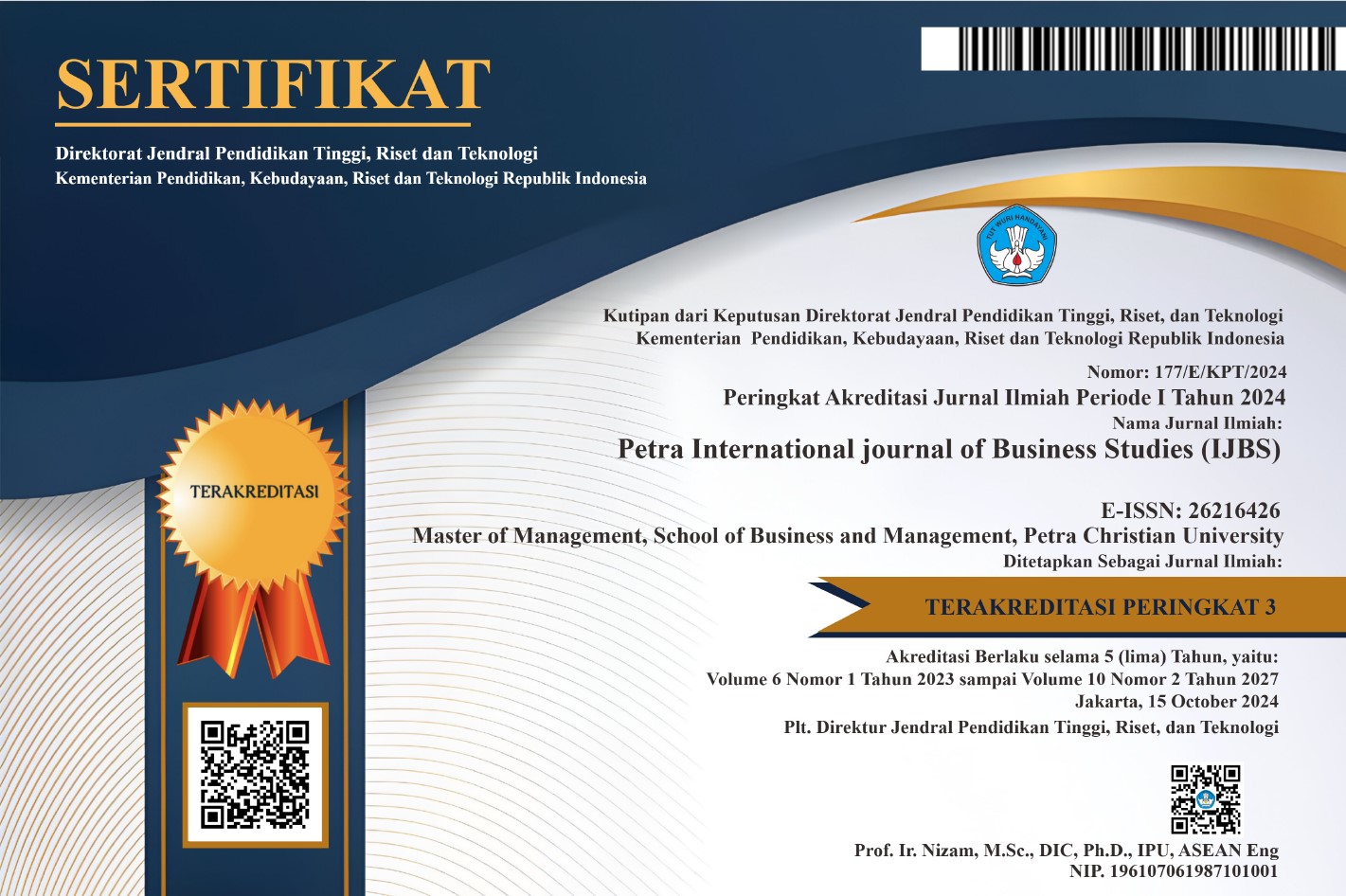Digital Transformation in Human Resource Management and Its Role in Gen Z Career Development: A Systematic Literature Review
DOI:
https://doi.org/10.9744/petraijbs.7.1.48-56Keywords:
Industrial Revolution 4.0, Human Resources Management, Gen Z, Digital Transformation, Career DevelopmentAbstract
With an emphasis on the career development of Gen Z, this systematic literature review explores the relationship between digital transformation and HRM. This study reveals the significant influence of digital technology on HRM practices, especially in areas like hiring, talent management, performance reviews, and staff development. This is achieved through rigorous screening and analysis using the Systematic Literature Review (SLR) to thoroughly address our research questions by systematically locating, assessing, and interpreting key findings from relevant studies of the chosen 19 key studies from 306 unique documents generated. The results show digital transformation's critical role in determining Gen Z workers’ career paths and the necessity for firms to modify their HRM strategies and practices to engage and support this generation of digital natives effectively.
Downloads
References
Aggarwal, A., Sadhna, P., Gupta, S., Mittal, A., & Rastogi, S. (2022). Gen Z entering the workforce: Restructuring HR policies and practices for fostering the task performance and organizational commitment. Journal of Public Affairs, 22(3). https://doi.org/10.1002/pa.2535
Barhate, B., & Dirani, K. M. (2022). Career aspirations of generation Z: a systematic literature review. In European Journal of Training and Development, 46(1-2), 39–157. Emerald Group Holdings Ltd. https://doi.org/10.1108/EJTD-07-2020-0124
Coetzee, M. (2022). Career agility for purposive career exploration: Role of adult learners' career orien-tations and a digital-era world of work awareness. African Journal of Career Development, 4(1). https://doi.org/10.4102/ajcd.v4i1.54
Chart: How gen z employment levels compare in oecd countries, World Economic Forum. (n.d.). Retrieved February 27, 2024, from https://www.weforum.org/agenda/2021/03/gen-z-unemployment-chart-global-comparisons/?trk=article-ssr-frontend-pulse_little-text-block
Digital business strategies in blockchain ecosystems transformational design and future of global business. (n.d.). Retrieved from http://www. springer.com/series/1505
Fathima, A. N. A., U, M., Selvi, K., Fathima, M. A. N. A., & Selvi, M. U. K. (2023). Digital transformation on human resources. Retrieved from https://www.researchgate.net/publication/371608533
Flatt, A., & Drewery, D. (2023). How career develop-ment professionals can close the gap between human resources and gen z (pp. 195–213). https://doi.org/10.4018/978-1-6684-7442-6.ch011
Febriana, A., & Mujib, M. (2024). Increasing productivity of gen z employees: the role of flexible work arrangements and participative style. SA Journal of Human Resource Management, 22. https://doi.org/10.4102/sajhrm.v22i0.2489
Fu, F. (2022). Digital transformation: a reflection from HRM perspective. Mental Health & Human Resilience International Journal, 6(1). https://doi.org/10.23880/mhrij-16000167
Garrard, J. (n.d.). Health sciences literature review made easy : the matrix method.
Give Gen Zs regular performance reviews or risk resignations, survey reveals. Retrieved from StaffCircle. https://www.staffcircle.com/blogs/ give-gen-zs-regular-performance-reviews-or-risk-resignations-survey-reveals/
Hooley, T., & Staunton, T. (2020). The role of digital technology in career development. In The Oxford Handbook of Career Development (pp. 297–312). Oxford University Press. https://doi.org/10.1093/oxfordhb/9780190069704.013.22
Indra Hermanu, A., Citra Sondari, M., Dimyati, M., & Sari, D. (2022). Study on university research performance based on systems theory: systematic literature review. International Journal of Productivity and Quality Management, 35(4).
Kirilmaz, S. K. (2020). Digital transformation in human resources management: investigation of digital HRM practices of businesses. Pressacademia, 7(3), 188–200. https://doi.org/10.17261/pressacademia.2020.1282
Makarem, Y., & Wang, J. (2020). Career experiences of women in science, technology, engineering, and mathematics fields: A systematic literature review. Human Resource Development Quarter-ly, 31(1), 91–111. John Wiley and Sons Inc. https://doi.org/10.1002/hrdq.21380
Malik, A., Ahsan Ali, M., Scholar, Mp., & Pakistan, M. (2022). Sustainable business and society in emerging economies employee perception, barriers towards career development and HRM strategies tenacity employee career development under a Creative Commons Attribution-Non-Commercial-4.0. Sustainable Business and Society in Emerging Economies, 4(2). www.publishing.globalcsrc.org/sbsee
Marleyna, Y., Devie & Foedjiawati. (2022). Reward system, employee engagement, and the role of employee satisfaction as mediating variable. International Journal of Business Studies, 5(1), 97-108. https://doi.org/10.9744/ijbs.5.1.97-108
Mineva, O., Alikaeva, M., & Minev, V. (2020). Transformation of career management approaches in the digital society. MEST Journal, 8(2), 143–150. https://doi.org/10.12709/mest.08.08.02.16
Meenakshi, K. (2020). The impact of pandemic covid -19 in workplace. European Journal of Business and Management. https://doi.org/10.7176/EJBM/12-15-02
Mohamed, A. (2023). HRM in the digital era: exploring the impact of technology and digital transformation on HRM practices and strategies in Somalia. European Journal of Business and Management. https://doi.org/10.7176/EJBM/15-15-06
Plis, K., & Schislyaeva, E. (2020). Digital transfor-mation in business in the modern world - a new approach to the development of human capital. Proceedings of the International Scientific Conference - Digital Transformation on Manufacturing, Infrastructure and Service, 1–6. https://doi.org/10.1145/3446434.3446454
Saram, M., Aburumman, O. J., & Hasan, A. (2023). The impact of HRM practices and employee behavior on career success. Problems and Perspectives in Management, 21(1), 326–335. https://doi.org/10.21511/ppm.21(1).2023.28
Sutanto, E.M. & Valentine, L. (2022). The employee performance in the Covid-19 pandemic and its antecedents. International Journal of Business Studies, 5(1), 22-29. https://doi.org/10.9744/ijbs.5.1.22-29
Vardarlier, P. (2020). Digital transformation of human resource management: digital applica¬tions and strategic tools in HRM (pp. 239–264). https://doi.org/10.1007/978-3-030-29739-8_11
Wang, L., Zhou, Y., & Zheng, G. (2022). Linking digital HRM practices with hrm effectiveness: the moderate role of HRM capability maturity from the adaptive structuration perspective. Sustainability (Switzerland), 14(2). https://doi.org/10.3390/su14021003
Wahdaniah, Sucianti, R., Ambalele, E., & Tellu, A. H. (2023). Human Resource Management trans-formation in the digital age: recent trends and implications. International Journal of Applied Research and Sustainable Sciences, 1(3), 239–258. https://doi.org/10.59890/ijarss.v1i3.902
Workplace Trends 2024. Retrieved from Glassdoor. https://www.glassdoor.com/research/workplace-trends-2024
Yulianty, P. D., Senen, S. H., Puspa, N., & Yulianty, D. (2023). Analysis systematic literature review: the study of HRM transformation into digital-based ghrm future research agenda. West Science Business and Management, 1(5), https://doi.org/http://dx.doi.org/10.58812/wsbm.v1i05.517
Zhang, D., Pee, L. G., & Cui, L. (2021). Artificial intelligence in E-commerce fulfillment: A case study of resource orchestration at Alibaba’s Smart Warehouse. International Journal of Infor¬mation Management, 57, 102304. https://doi.org/10.1016/j.ijinfomgt.2020.102304
Additional Files
Published
Issue
Section
License
Copyright (c) 2024 Immanuella Anita Indroputri, Regi Sanjaya

This work is licensed under a Creative Commons Attribution 4.0 International License.
Petra IJBS (e-ISSN: 2621-6426) is published by Master of Management program, School of Business and Management, Petra Christian University, Indonesia (MM SBM PCU).












